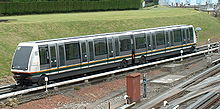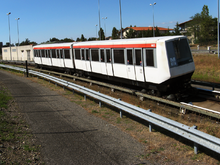- Véhicule Automatique Léger
-
VAL is a type of automatic rubber-tired people mover technology, based on an invention by Professor Robert Gabillard (Université Lille Nord de France). It was designed in the early 1980s by French Matra, for the then new metro system in Lille.
The acronym was originally for Villeneuve d'Ascq à Lille (Villeneuve d'Ascq to Lille), the route of the first line to be projected (and inaugurated). It now officially stands for Véhicule Automatique Léger (automatic light vehicle).
In contrast to some other driverless metro systems like the Docklands Light Railway or Vancouver's SkyTrain, the VAL design uses platforms that are separated from the rollways by a glass partition, to prevent waiting passengers from straying or falling onto the rollways. Platform screen doors, which are produced by Swiss glass door manufacturer Kaba Gilgen AG, embedded in these partitions open in synchrony with the train doors when a train stops at the platform.
When VAL was introduced to Taipei, the term medium capacity system was coined to differentiate VAL from heavy rail (metro). Thus this term is being applied mainly among Asian cities and railway planners though they are not using VAL's technology. In Siemens official site, VAL is advertised "first fully automated light metro", in which the term "light metro" can be traced back to Moscow Metro Butovskaya Light Metro Line.
Contents
List of VAL systems
The Lille metro was inaugurated on April 25, 1983. VAL systems were subsequently built in several other French cities, including:
- Paris Orlyval, 1991
- Toulouse Metro, 1993
- Rennes Metro, 2002
- Paris CDGVAL, April 2007
Outside of France, VAL systems are also used in:
- Chicago O'Hare's Airport Transit System (opened in 1993)
- Taipei's Brown Line (opened in 1996, larger variant using the MAGGALY technology from Lyon Metro line D)
- Turin's Metrotorino (opened in 2006, just before the 2006 Winter Olympics)
A VAL system is in project in Uijeongbu, South Korea.[1] It is called the Uijeongbu LRT.
The Chicago O'Hare and Taipei lines use the wider VAL 256 version of the system.
Jacksonville had a VAL line inaugurated in 1989, which was shut down in December 1996 and replaced by a monorail, the JTA Skyway. The rolling stock was sold to O'Hare International Airport.
Other uses of VAL technology
The automatic trains on line 14 of the Paris Métro are not VAL, but they use part of the VAL technology. Siemens (the company that acquired Matra) is going to transform line 1 of the Paris Métro into an automatic system like line 14. Lyon's metro line D is a larger rubber-tyred metro; it was originally developed independently but ended up incorporating some components of VAL technology. The type of vehicle is the same of Paris lines 1, 4, 6, 11 and 14: rubber-tyred metro (trains that run on rubber tyres and steel wheels, in contrast to VAL trains, that use only rubber tyres).
NeoVal
In 2006, the NeoVal project, successor of the VAL, is announced. It will feature regenerative braking. 40 % of the 62 millions Euros of the programme will come from the AII (tech. supporting project). The program is managed by Siemens, in association with Lohr industrie. The NeoVal will be guided by a single central rail, similar to that of the Translohr, and will be able to operate without any electrical supply between the stations (no third rail or overhead), making the cost of infrastructure much lower [2].
CityVal
CityVal is based on the NeoVal system. 19 CityVal trainsets have been ordered for the second line of the Rennes Metro.[2]
See also
- Transportation in France
- Rubber-tyred metro
- Rubber-tyred trams
- Medium capacity system
- Bombardier Guided Light Transit
- Automated guideway transit
- People mover
- AnsaldoBreda Driverless Metro
References
External links
Categories:- Rail technologies
- People movers
- Automated guideway transit
- Rail transport in France
- Rail transportation in Taiwan
- VAL people movers
Wikimedia Foundation. 2010.




